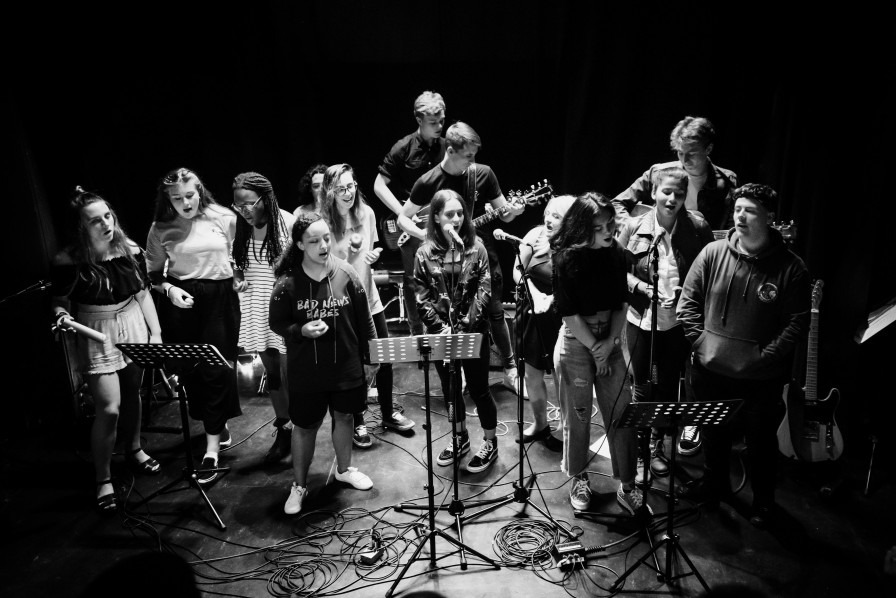Reflecting on the choice of using AQA Unit Accreditation System for Positive Labels Birmingham project by Meldra Guza.

A few days ago we run a wonderful event with Positive Labels Birmingham participants. It was very much a final celebration event where the young people were reflecting on their journey over the last 18 months whilst enjoying a cup of tea and cake. We also had guest speakers sharing their music industry experience and working with the young people towards creating plans for further musical and personal development. One of the key elements of the evening was reaping the benefits of their hard work- receiving the Positive Labels Birmingham CDs and the AQA Unit certificates outlining their achievements.
Of course their achievements reach much further than certificates and recorded songs; the participants have created memories, they have new friends, they have gained new skills. All of that is so heartwarming to see.
However in this blog I'd like to share our collective experience of establishing a new accreditation system for this specific project. Previously Positive Labels has been taking place in Stoke-On-Trent, Cannock, Tamworth, so when writing the funding application for Positive Labels Birmingham, we (The SongLab and Make Some Noise) were discussing various ways of gaining accreditation. As Positive Labels focusses on musical and personal outcomes, we felt that it was necessary for the accreditation to mirror that.
We looked into AQA Unit based accreditation. AQA offer a lot options to choose from when it comes to ready made Units, guidelines for completion of the Units. And even though some of the existing units could have been appropriate for Positive Labels Birmingham, we really wanted to make sure that the AQA Units used would be fit perfectly for the project and most importantly fit the diverse team of young people participating in the project.
In collective effort with Make Some Noise team, we created content, guidelines and assignment processes for 6 brand new AQA Units that the young people were working towards: Music Theory(Basic), Music Theory (Intermediate), Music Business, Songwriting- Top Line Writing, Songwriting- Bottom Line Writing and Artist Development Unit.
We had a lot of mini master classes and events where young people were learning more about music industry and potential career opportunities. That enabled them to see music industry in a more focussed and personalised way- in other words- seeing themselves as potential music industry participants! Following on from this knowledge we were heading in the direction of achieving the Artists Development Unit.
The content of Artist Development Unit consists of several parts: the young people defining themselves musically, showcasing ability to create a 6 month career plan as well as choosing alternative career routes within their skill set, additionally evaluating potential areas of improvement. The Artist Development Unit was the last one young people were completing as it required a wide selection of skills- personal, musical and social. There might have been some challenges along the way of achieving this unit, however reflecting on present and past allowed the young people to synthesise ideas of potential future careers.
Although we looked at these units through the eyes of being a musician, there were a lot of transferable skills developed along the way. For example, some of the young people initially struggled to introduce themselves, however by the end of the project not only they could say their name, but explain what type of music they like, what is their role in music and what their career plans are (within or outside of music).
The great thing about the AQA unit accreditation system that worked for Positive Labels Birmingham project is that we could personalise the smaller outcomes for each certificate and as a result each participant had a chance to either work towards all the certifications or just choose a few that they felt more enthusiastic about.
The AQA Unit certificates clearly indicate the concepts that have been a part of achieving that unit, which further can be used as a supportive tool in job interviews, when looking for work experience or further education routes.
From personal point of view, at times it might have been daunting go through the change of implementing this new system of accreditation in our work as it meant creating content, as well as worksheets for the practical and written assignments, creating the criteria for meeting the set outcomes and more... However looking back to the celebration event and the joy in the eyes of young people when each and every one of them had a few certificates to hold, something that they had achieved all by themselves- that made all the effort worthwhile!
